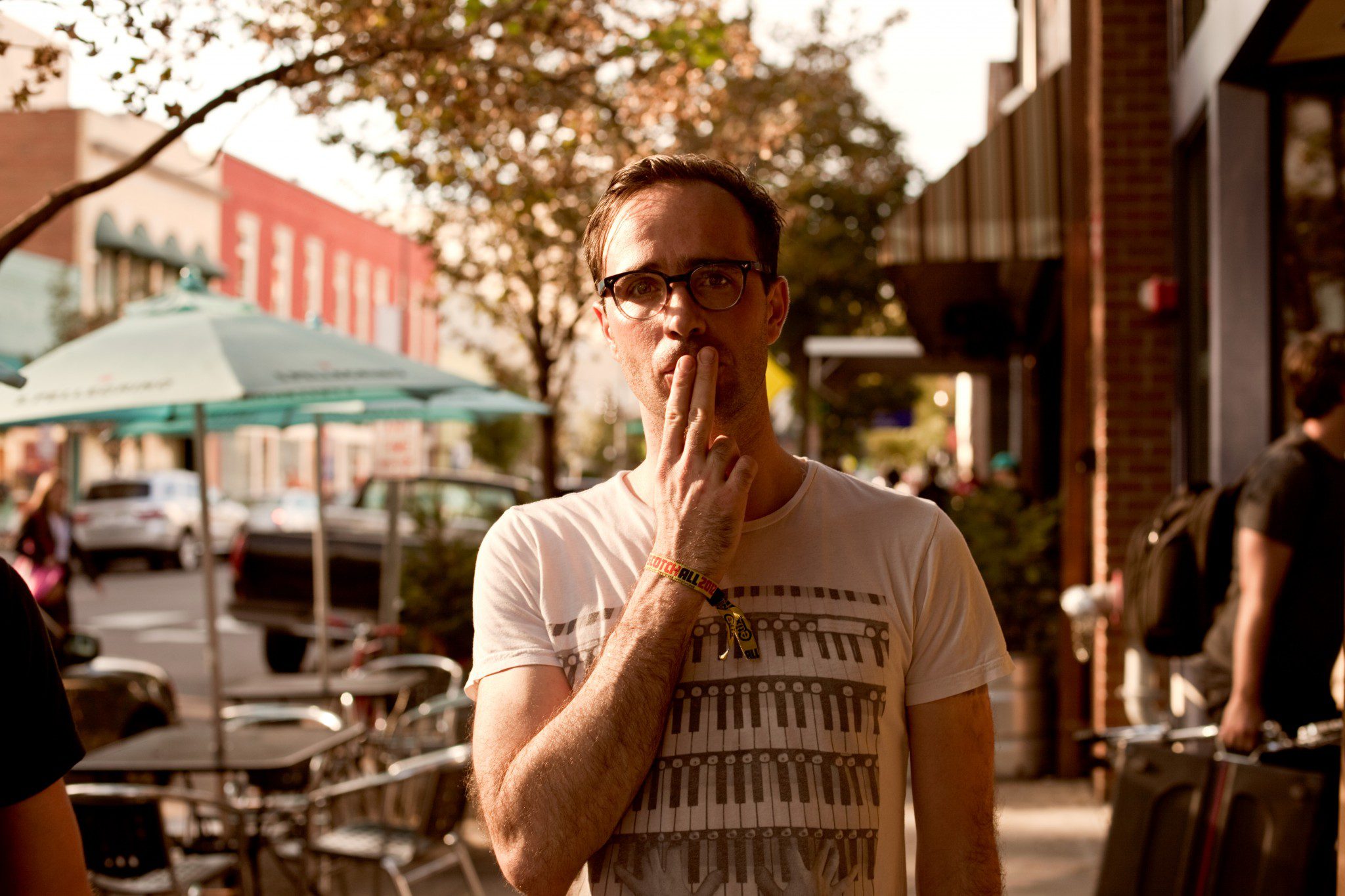

Back in 2019, as their sophomore record was starting to take shape, Steph Stewart and Mario Arnez, the core members of North Carolina-based country act Blue Cactus, questioned how the record was coming together. “I remember talking about this after we knew what songs we wanted to put on the record; we were hanging out by the pond where we used to live, and I was like, I don’t know how these songs that we’re writing right now are connecting,” remembers Stewart. It was a tumultuous time for the two of them; they had both ended long-term relationships and were settling into a relationship together after years of touring and playing music as friends. Though their thoughts, emotions, and the resulting songs seemed scattered at the time, Stranger Again, the album they released last week via Sleepy Cat Records, would come to be a meditation on preserving relationships as both musicians took stock of the shortcomings and strengths that had gotten them to that point.
“We did not sit down and say ‘we want to write a relationship album’ or anything, but I think it was a by-product of what was going on for us personally. That’s how we were living and what we wrote about – we were realizing how important our relationship was and wanting to make sure that we were actively participating in it so we didn’t repeat mistakes from past relationships,” Stewart says. “It was almost like we had to get out of our immediate lives and look at it from above.”
“We definitely couldn’t see it in the moment,” adds Arnez, “but after seeing all the songs laid out in a list of what we were excited about having on the album, it became pretty clear that there was a thread running through them for sure.”
In particular, the title track became a thematic touchstone. “It’s about having to put in work to keep things fresh and new regardless of the circumstances,” Arnez explains. “I think, in a way, that is creative work in itself, right? You’re living your life and you’re going through your day to day and you gotta keep things fresh and exciting regardless of what’s going on.”
That didn’t just apply to settling into romantic partnership – it applied to their creative partnership as well, translating to a major expansion of their sound into an amalgamation of rock, folk, and Americana they think of as “cosmic” country. It’s quite the departure from the over-the-top, carefully studied Country & Western twang of their 2017 self-titled debut, which made liberal use of tongue-in-cheek song titles – like “I Can’t Remember (To Forget You)” and “So Right (You Got Left)” – that would hardly be out of place in a honky-tonk jukebox alongside ’70s classics.
“Our approach to songwriting was really different on the first record. The parenthetical titles were very much a starting point for a lot of the songs, and that was a new way of writing for us; I had a little notebook of just song titles that we were spit-balling,” Stewart says, citing George Jones’ 1974 LP The Grand Tour as a major influence. “Even though we had various things going on in our personal lives that maybe played in to the type of songs we were writing, we were trying to do the country thing.”
“The self-titled album was us geeking out on different country music elements really, and having a lot of fun playing with each other and with writing,” Arnez says, though he notes that constructing punch lines ultimately began to feel too predictable. “After getting an album’s worth of material out, and a little bit extra I’d say, I think we sort of were feeling we wanted to step away from playing with tropes.”
“This record’s very different – these songs were from a very emotional place. Introspective. I wasn’t really thinking about the song title until it was done. A lot of them wrote themselves, I think for both of us,” Stewart says. “We were looking at all the tracks and [‘Stranger Again’] seemed like it spoke to the overall theme that we had realized was running through these songs, and also really showed that shift in our sound.”
The duo learned some things along the way – mainly that their collaborative songwriting process could benefit from solitude during its initial stages. To that end, they’ve built occasional creative retreats into their schedules. They also began collecting band members who have had significant impact on the Blue Cactus sound, like bassist Alex Bingham. “Alex co-produced the album with us, and loves trying new things with the songs, so even if we come to him with what we feel is like a complete version, he brings some interesting ideas to try that I think Mario and I wouldn’t always come up with on our own,” says Stewart.
One such example was “Worried Man,” originally a bluegrass track that got an impromptu revamped groove at the time of the recording. “Working with Alex, that song shifted into this really cool seventies country disco kind of beat that just happened right in the moment of recording it,” remembers Stewart. “It felt so jarringly different than what I was used to that I actually did not like it at the time.”
“We were deep into the session at this point so there wasn’t any time to back up at all,” Arnez adds. “That was probably the second or third time we had actually played that groove on the recording. The whole thing still feels really exciting to me because that energy is there, where we don’t know what’s gonna happen. We’re all flying by the seat of our pants in a pretty fun way.”
“In the moment, it wasn’t really something that I thought I liked, but I stepped away from it and revisited it,” Stewart admits. “The song is about appreciating the things about someone when they’re gone that you didn’t at the time when they were alive – it really celebrates that in a different way with the new vibe and groove that Alex suggested us trying out. I really love Whit Wright’s pedal steel on it, the way it kicks off right at the top with him playing that lick. HC McEntire did the high harmony on it, and I really love the blend of all three of us singing the chorus.”
“In general I think we have a process of finding answers quickly for certain things creatively, seeing the simplest answer to a certain kind of song we wanna write, and then figuring out different ways to subvert it along the way, do something that’s musically satisfying but less predictable,” explain Arnez.
Equally as important has been the support – on multiple levels – from Blue Cactus drummer Gabe Anderson. “He’s also the co-founder of Sleepy Cat Records which is putting this album out, so he’s really this essential backbone, and such a good friend, and he just naturally knows what his role is in these songs,” Stewart says. “It’s pretty incredible.”
In fact, North Carolina’s Research Triangle – Raleigh, Durham, and Chapel Hill, where the band lives – has been an altogether supportive scene since the earliest iterations of Blue Cactus. Stewart grew up nearby, singing Patsy Cline and The Cranberries at Golden Palace karaoke every Wednesday with her family, while Arnez goofed around with tape recorders and mini Casio keyboards in Southwestern Florida, where his mom was a media specialist at his school. One of Arnez’s college friends, Omar Ruiz-Lopez, had moved to Chapel Hill and happened to be playing in a string band with Stewart; once he convinced Arnez to move, Arnez made Steph Stewart & the Boyfriends a four-piece, and they’d all sing around the same mic. Their bandmates’ priorities shifted to raising families and leaving the Triangle, but the musical magic they made as a duo couldn’t be ignored – and Blue Cactus formed, sticking close to the scene that nurtured them.
That magic is still at the root of this latest batch of songs, because everything Arnez and Stewart write has to pass a litmus test of sorts. “We start the song as a duo, before it goes to a band, essentially. From the natural process of making sure we can deliver it as a duo, I feel like that’s sort of the proving ground in a way, from a performance and arrangement perspective,” Arnez details. “Feeling like our vocals and two guitars can make it feel complete, it always feels like a pretty easy, natural process to add a whole band on top of it from there.” He cites iconic duos like The Everly Brothers and Gillian Welch and David Rawlings as a jumping off point, but from there, Blue Cactus wrangle an astonishing variety of sounds, from the nostalgic sway of “Rodeo Queen” to the rollicking stomp of “Rebel” to the cinematic crackle of “Radioman” to the subtle sensuality of “Stranger Again.”
In early 2020, Blue Cactus released a few singles, fully intending to put out Stranger Again soon after. But as the pandemic tightened its grip on the music industry, the time never felt right; they decided to hold the album and as lockdown wore on and civil unrest rocked American cities, the songs, too, became strange to the people that made them.
“[It] was pretty weird sitting on this album. Music had been our full-time commitment,” Arnez says. “Obviously [with] no way to do it the way we had been doing it, we started feeling estranged from music in a way. It felt hard to even be creative for months.” The couple got part-time jobs at a local co-op grocery and began, in some ways, to re-evaluate their priorities as musicians.
“Before the pandemic we felt like we had to take every opportunity that presented itself, and play a bunch of gigs – not really be very critical of what we were doing, just work very, very hard. And I think that can work for people and it could work for us potentially, but it just doesn’t feel like an authentic existence,” says Stewart. “We’re going to play shows when it’s safe, but we’re not just gonna play a bunch of loud bars, and honestly, we were doing that quite a bit on tour before. We can be a little more choosy in the shows we’re playing and not just sort of go everywhere all the time.”
“It’s fun to drive up to New York and [play a gig], but… that was about as far as some of the planning went, you know? A show gets booked and then you drive all the way to go do it, and not much else happens other than burning a lot of gas,” adds Arnez.
As Blue Cactus returned to the Stranger Again tracks that sat on the shelf for so long, many of them began to take on new meanings, too. “I Can’t Touch You,” once about falling short of expectation, took on a very literal meaning as social distancing became the new normal. While Arnez says hearing the recording transports him back to the studio, Stewart points out that playing it for a backyard full of friends post-vaccination took on “this whole new level of relevance.”
“The pandemic and everything gave us the chance to put our music down and just tap into the world around us and be a part of it in really meaningful ways. So then, when we came back to these songs… I feel like I fell in love with them all over again. They’ve revealed themselves to be about other things to me that I didn’t even realize they were about, so it’s been a really nice process actually, to get to know them again,” she explains.
Stewart can also appreciate the new meanings that listeners bring to each of the songs, particularly the raw honesty of “Come Clean.” Shortly after it was written, Stewart shared it amongst some friends, and one of them, who stars in the gorgeous visual for the track, had an unexpected take on the song’s message. “He just came up to me, in tears, and told me how he remembered when he came out to his family as a teenager and what that was like for him, and that’s what the song meant to him. I never really thought about it meaning other things to other people – I just knew where it came from for me,” Stewart recalls. “I think everybody has a kind of universal experience – we grow up, and we realize that a lot of times we’re not the person we were raised to be or were told we were. You hopefully get to become who you really are in your lifetime.” To reflect that poignant message, Stewart wanted to tell a variety of stories with the music video, which Anderson shot and Arnez edited. In addition to Stewart’s friend and his partner, it stars Chapel Hill’s poet laureate CJ Suitt and dancer Anna Maynard, who add choreographed movements to illustrate the narrative further.
At the end of the day, the biggest hope Blue Cactus has for Stranger Again is that folks will find new meanings every time they listen to it, imbuing each track with their own perspective. “A little something that we sort of have in the back of our minds when we’re writing is that there is this little bit of space that is left for the listener to insert themselves into it and complete it, in a way,” says Arnez.
“I don’t have a specific takeaway I want them to get out of it other than some significance for themselves. I want people to connect with it in their way, whatever that means for them.” Stewart adds. “When I fall in love with an album, the meaning will totally change depending on the context of what’s going on in my life, and I hope that’s the case for people who listen to this record – that they’ll put it on the shelf for a little while and then come back to it when they feel like they need it, and it will be there for them.”
Follow Blue Cactus on Instagram and Facebook for ongoing updates.



